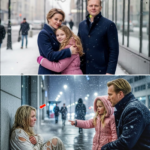
The day started like any other in the first-grade classroom at San Benito Elementary School. Children laughed, unpacked their bags, and found their seats—except for one. Six-year-old Valentina stood motionless by her desk, her backpack still on, her eyes glued to the floor.
When teacher Daniel Martínez noticed, he paused. Something wasn’t right. As the other students settled in, Valentina remained pale and frozen, her small hands clenched. He crouched down gently to meet her gaze.
“I can’t sit. It hurts,” she whispered.
Daniel’s heart dropped. “Did you fall? Did something happen at home?” he asked softly. But Valentina just shook her head and clutched her fingers tighter. “It hurts… down there,” she murmured, barely audible.
With a calm voice and gentle movements, Daniel led her to a quiet corner of the classroom. “Let’s sit together over there, just for a moment,” he suggested. But she stopped him, eyes shimmering with tears.
“Can I stay standing, please?” she asked.
He nodded, but inside, something broke. That wasn’t a scraped knee or a clumsy fall. That was fear.
Daniel stepped out quietly, hands trembling as he dialed the police. “This is Daniel Martínez from San Benito Elementary. I have a student—six years old—she says it hurts to sit. I can’t be sure what’s going on, but something’s wrong. Please, come quickly.”
When the officers arrived shortly after 8:30, there were no sirens. Just calm voices and careful steps. Principal Carmen Ávila met them at the entrance, trying to downplay the situation. “I think it’s been exaggerated,” she said, forcing a polite smile.
But the officer—especially the female one—saw through it. Inside the classroom, Daniel explained what happened, his voice steady but urgent.
“She didn’t want to sit. She said it hurts. The way she said it—it’s not normal.”
The principal interjected. “Please, Daniel, it could be anything. Kids fall, they get bumps. This isn’t something to involve the police for.”
The officers requested to speak to Valentina privately. She entered the room slowly, eyes wide with worry. The female officer knelt down, smiling.
“Hi, sweetheart. We just want to chat a little, okay?”
Valentina nodded but said nothing.
“We heard sitting hurts. Is it better now?”
Valentina looked down. “It’s gone now,” she whispered.
The officers left after a few minutes. No bruises, no complaints, no evidence. “There’s nothing we can do… not yet,” one of them told Daniel.
“She’s afraid,” Daniel insisted.
The female officer gently replied, “If there are signs—real signs—call us again. We’ll be ready.”
But the patrol car left, and school life continued as if nothing had happened. Carmen pulled Daniel aside. “You need to be more careful. These things cause unnecessary alarm.”
Daniel didn’t sleep that night. He kept replaying Valentina’s voice, her eyes, her refusal to sit. The silence screamed louder than any words.
The next day, Valentina arrived last. She didn’t sit.
“Can I draw while standing?” she asked quietly.
“Of course,” Daniel replied with warmth.
The class assignment was simple: draw a place you know well. Kids drew parks, pets, grandparents. Valentina drew slowly, seriously, in silence.
When she finished, she turned her paper face-down and crossed her arms.
Daniel moved through the classroom, praising each drawing. When he reached hers, he flipped it over and felt a chill crawl down his spine.
A chair. Alone in the middle of the page. Surrounding it—red blotches like scattered blood. The lines trembled but told a clear story.
He crouched beside her. “This is yours, right?”
She nodded.
“Do you want to tell me about it?”
She bit her lip and stayed silent.
“That’s okay. You don’t have to talk now.”
She looked him in the eye for the first time.
“I like how you talk to me,” she said.
Daniel smiled, tears in his eyes. “And I like how you draw.”
After class, he took the drawing straight to the school psychologist. Leticia reviewed it, her expression turning grave.
“It’s symbolic… but serious. Very serious,” she said. “She’s not being heard. But she’s starting to open up to you. That could be our only chance.”
Daniel nodded. He gave Valentina a blank sheet of paper with a note: If you want to tell me something, you can draw it.
For the first time, she smiled. Just a little, but enough to say: she was starting to trust him.
That Friday, the day was heavy with gray skies. Valentina stayed close to Daniel, shifting uncomfortably whenever she tried to sit.
As school ended, Daniel noticed a man waiting by the gate—tall, arms crossed, stern face. He didn’t look like a loving parent.

“That’s her guardian,” the school inspector said.
Valentina froze. Her faint smile vanished.
The man—Rogelio—was impatient. “Hurry up,” he snapped.
Daniel walked over. “Are you Valentina’s father?”
The man turned. “Stepfather. Who are you?”
“I’m her teacher—Daniel Martínez.”
Rogelio narrowed his eyes.
“I just want to make sure she’s okay. She’s been in pain lately. Said sitting hurts.”
Rogelio gave a dry laugh. “Kids make things up. You should stick to teaching, not poking your nose where it doesn’t belong.”
Daniel stayed calm. “I’m just doing my job.”
Rogelio said nothing more. He grabbed Valentina’s arm and walked off. She didn’t say a word.
Daniel couldn’t let it go. That evening, he called the emergency number on Valentina’s school file. Her mother, Rebeca, answered.
“Yes, everything’s fine,” she said quickly. “Valentina’s just sensitive. She’s adjusting to a new school, that’s all.”
Daniel pushed gently. “I understand. I just want to help.”
A long pause. “Thank you… but there’s nothing to worry about.”
Click. The call ended.
The next morning, Daniel went to her house. A narrow street, worn-out buildings, and a door barely held up. A boy, around 10, answered.
“Hugo,” he said. “I’m her brother. She’s not home—she went to the market with Rogelio.”
Daniel asked about their mom. “She’s asleep,” Hugo said, glancing toward the dark interior.
Inside, no toys. No books. Just stains and silence.
“Do you still go to school?” Daniel asked.
“Used to. Now I stay home to take care of things.”
Daniel crouched. “Can I ask you something, Hugo?”
The boy nodded.
“When Valentina cries… what happens?”
Hugo looked away. “He doesn’t like it.”
“Who?”
“Rogelio.”
“And what does he do?”
The boy hesitated. Then, as if reciting something normal: “He yells… sometimes hits her with a belt. Says it’s so she learns.”
Daniel closed his eyes. The weight in his chest was no longer just worry—it was certainty.
“Have you told anyone?”
“No. If we do… mom might leave for good.”
Daniel gave him his name, number, and a simple promise. “If you ever need me, I’m here.”
That Monday, Daniel entered school with a folder: Valentina’s drawing, notes, and Hugo’s statement. He went straight to child protection services.
He told the story, showed the evidence. But the worker, despite her concern, responded with a sigh.
“I understand… but we still don’t have enough for direct intervention.”
Daniel’s fists clenched. “A six-year-old says it hurts to sit. Her brother says there’s a belt. How is that not enough?”
The answer was bureaucratic. Cold. And unacceptable.
But Daniel wasn’t giving up.
Because sometimes, silence is a scream. And a single child—afraid to sit—is enough reason to stand.
News
Virgínia Rompe o Silêncio Sobre Leonardo no Hospital e Revela Mágoa Que Ninguém Imaginava
A segunda-feira começou tensa para o mundo sertanejo e para milhões de seguidores atentos a cada movimento da família Costa….
Virgínia rompe o silêncio, se recusa a visitar Leonardo no hospital e expõe ferida que vinha crescendo dentro da família
A madrugada de segunda-feira começou diferente. Ainda antes do sol nascer, portais de Goiás noticiaram que Leonardo havia sido internado…
Sumiço de Neymar em Paris e Story de Biancardi Acendem Alerta: Coincidência ou Recado Silencioso?
O silêncio, às vezes, fala mais alto do que qualquer pronunciamento. E foi exatamente esse silêncio que transformou a ausência…
O silêncio de Neymar, o sumiço repentino e a indireta de Biancardi que deixou tudo ainda mais tenso
Tudo aconteceu de forma silenciosa demais para ser normal. Sem anúncio oficial, sem justificativa clara e sem aquela movimentação típica…
O pedido inesperado das Marias para o Natal deixa Virgínia sem reação e derrete a internet
O clima já era de festa, casa cheia, risadas espalhadas pelos cômodos e aquele barulho gostoso de família reunida quando…
O Pedido de Natal das Marias que Deixou Virgínia em Choque e Derreteu a Internet
O Natal ainda nem chegou, mas um momento simples dentro de casa foi suficiente para emocionar, arrancar risadas e surpreender…
End of content
No more pages to load









